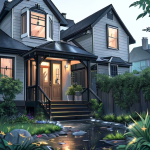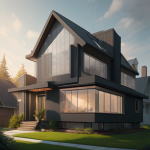Denver Homeowners’ Guide: Maximizing Energy Efficiency with Insulated Windows
Battling Denver’s Climate: The Power of Insulated Windows
Denver homeowners face a particularly demanding climate, a reality that significantly impacts home energy efficiency. The city’s mile-high altitude, coupled with its dramatic temperature swings – from sweltering summers pushing into the 90s to frigid winters often plummeting below freezing – creates a constant battle against energy loss. These conditions place a heavy burden on heating and cooling systems, leading to inflated utility bills. Often, the most vulnerable point in a Denver home’s energy defense is its windows.
Inefficient windows act as thermal gateways, allowing heat to escape during winter and enter during summer, negating the efficiency of HVAC systems. Upgrading to insulated windows is a pivotal step towards mitigating these losses, enhancing home comfort, and achieving substantial savings on energy costs. One of the most effective strategies for combating Denver’s climate extremes is investing in energy-efficient windows. Studies have shown that homes with outdated or single-pane windows can lose up to 30% of their heating and cooling energy through the glass.
This translates to hundreds, even thousands, of dollars wasted annually. Insulated windows Denver, particularly double-pane windows Denver and triple-pane windows Denver, significantly reduce this energy transfer. These windows incorporate multiple layers of glass with insulating gas fills, such as argon or krypton, creating a thermal barrier that minimizes heat flow. Furthermore, low-E windows Denver, featuring a special coating that reflects radiant heat, provide an additional layer of protection against both solar heat gain in summer and heat loss in winter.
This comprehensive guide serves as a valuable resource for Denver homeowners seeking to improve home energy efficiency Denver through window replacement Denver. We will delve into the various types of insulated windows available, explain key performance metrics like R-values and U-factors, and explore the additional benefits of upgrading, such as noise reduction and UV protection. Furthermore, we’ll provide practical advice on assessing your current windows, choosing the right window installers Denver, and navigating available energy rebates Colorado and tax credits to make this important home improvement project more affordable. Whether you’re considering vinyl windows Denver, wood windows Denver, or aluminum windows Denver, understanding the nuances of insulated window technology is crucial for making informed decisions that will benefit your home and your wallet for years to come.
Decoding Insulated Windows: Types, R-Values, and U-Factors
Choosing the right insulated windows for Denver’s climate requires understanding the different types available and their performance metrics. Double-pane windows are a standard upgrade, featuring two panes of glass with a layer of gas, such as argon or krypton, between them. Triple-pane windows offer even greater insulation with three panes of glass and two gas-filled layers. Low-E (low-emissivity) coatings are thin, transparent coatings applied to the glass to reduce heat transfer. These coatings reflect radiant heat, keeping your home cooler in the summer and warmer in the winter.
R-value measures a window’s resistance to heat flow; the higher the R-value, the better the insulation. U-factor, on the other hand, measures the rate of heat transfer; a lower U-factor indicates better insulation. In Denver’s climate, look for windows with a low U-factor (ideally 0.30 or lower) and a high R-value (at least R-3). Consider the orientation of your home when selecting windows. South-facing windows benefit most from low-E coatings that reduce solar heat gain in the summer, while north-facing windows benefit from coatings that minimize heat loss in the winter.
Beyond the basic double-pane versus triple-pane decision, Denver homeowners should consider the frame material, which significantly impacts overall energy efficiency. Vinyl windows Denver are a popular, cost-effective choice offering excellent insulation and minimal maintenance. Wood windows Denver provide a classic aesthetic and good insulation but require more upkeep. Aluminum windows Denver, while durable, are less energy-efficient than vinyl or wood unless they incorporate thermal breaks to minimize heat transfer. When evaluating window replacement Denver options, factor in the long-term costs associated with each material, including potential energy savings and maintenance expenses.
Consulting with experienced window installers Denver can provide valuable insights tailored to your specific home and budget. The type of Low-E coating also matters. Different Low-E coatings are designed to optimize performance for specific climates and window orientations. For example, a passive Low-E coating maximizes solar heat gain, making it suitable for north-facing windows in Denver to capture as much winter sunlight as possible. Conversely, a solar control Low-E coating minimizes solar heat gain, ideal for south-facing windows to prevent overheating during the summer months.
Understanding these nuances is crucial for maximizing home energy efficiency Denver and reducing reliance on air conditioning. Discussing your home’s specific needs with window professionals will ensure you select the Low-E coating that provides the best year-round performance. Navigating the world of energy-efficient windows Denver also means understanding available resources like energy rebates Colorado. Xcel Energy, for instance, often offers rebates for installing energy-efficient windows that meet specific performance criteria. These rebates can significantly offset the initial investment in new windows, making the upgrade more affordable. Furthermore, investing in insulated windows Denver can increase your home’s resale value, appealing to environmentally conscious buyers. Be sure to keep detailed records of your window replacement Denver project, including product specifications and installation dates, to facilitate potential future home sales and demonstrate your commitment to sustainability.
Beyond Energy Savings: Noise Reduction, UV Protection, and Home Value
The benefits of insulated windows extend far beyond mere energy savings, rippling outwards to enhance various aspects of Denver homeowners’ lives. Improved noise reduction is a significant advantage, creating a quieter and more peaceful home environment, especially valuable in busy Denver neighborhoods near I-25 or undergoing construction. Double-pane windows, and particularly triple-pane windows, act as effective sound barriers, minimizing the intrusion of traffic noise, sirens, and neighborhood commotion. Imagine transforming your home into a tranquil sanctuary, shielded from the urban hustle.
According to a recent study by the National Association of Home Builders, homes with upgraded windows experience a noticeable decrease in ambient noise levels, contributing to improved sleep quality and overall well-being. This is a particularly salient point for Denver residents increasingly valuing the peace and quiet of their homes. Beyond aural comfort, insulated windows also act as a formidable shield against harmful UV rays, protecting your furniture, carpets, and artwork from fading and degradation.
Standard windows allow a significant amount of UV radiation to penetrate, leading to discoloration and damage over time. Low-E windows Denver are specifically designed with a special coating that reflects a substantial portion of these harmful rays, preserving the vibrancy and longevity of your interior décor. This UV protection not only saves you money on premature replacements but also safeguards valuable possessions, ensuring they remain in pristine condition for years to come. It’s a subtle yet powerful way to maintain the aesthetic appeal and value of your home.
Furthermore, upgrading to energy-efficient windows can significantly increase your home’s value, making it a worthwhile investment in the competitive Denver real estate market. Homes with energy-efficient features are increasingly attractive to prospective buyers who are conscious of long-term operating costs and environmental impact. New window replacement Denver projects not only enhance curb appeal but also contribute to a higher energy efficiency rating, often highlighted in property listings. Real estate agents frequently emphasize the benefits of insulated windows Denver, such as reduced energy bills and improved comfort, as key selling points.
In a market where sustainability is gaining prominence, investing in energy-efficient upgrades like vinyl windows Denver, wood windows Denver, or aluminum windows Denver can give your home a distinct advantage and potentially command a higher sale price. Think of it as adding a sought-after amenity that pays dividends both now and in the future. “Energy-efficient homes are becoming increasingly desirable in Denver,” notes local real estate expert Sarah Thompson of Denver Realty Group. “Buyers are willing to pay a premium for features that lower their utility bills and reduce their carbon footprint, making window upgrades a smart investment for homeowners looking to sell.”
Assessing Your Current Windows and Choosing the Right Installer
Before investing in new windows, a thorough assessment of your current windows’ efficiency is paramount, especially considering Denver’s demanding climate. Begin with a meticulous visual inspection, scrutinizing each window for telltale signs of damage like cracks, gaps, or warping in the frames. These imperfections compromise the window’s ability to maintain a consistent indoor temperature. Pay close attention to the window seals; condensation nestled between the panes is a clear indicator of seal failure, rendering the window’s insulating properties virtually useless.
A simple yet effective test involves using a lit candle or incense stick near the window frame. If the flame flickers erratically or the smoke wavers, it’s a definitive sign of drafts infiltrating your home, signaling the need for window replacement Denver. Addressing these issues proactively can significantly improve home energy efficiency Denver. Beyond the basic inspection, consider the age and type of your existing windows. Older single-pane windows are notorious energy drains compared to modern insulated windows Denver options.
Double-pane windows Denver, with their gas-filled space between the panes, offer a significant improvement, while triple-pane windows Denver provide even superior insulation, crucial for Denver’s temperature extremes. Furthermore, the glass itself plays a role. Low-E windows Denver, coated with a microscopically thin, transparent layer, reflect radiant heat, keeping your home cooler in summer and warmer in winter. Identifying these factors will help you determine the scope of window replacement Denver needed and inform your decision-making process when selecting new, energy-efficient windows Denver.
Choosing the right window installers Denver is as crucial as selecting the right windows. Prioritize licensed and insured contractors with a demonstrable track record of successful installations in the Denver area. Request references from previous clients and diligently check online reviews to gauge their reputation and service quality. A reputable installer will conduct a thorough assessment of your home’s specific needs, provide a detailed and transparent quote outlining all costs, meticulously explain the installation process, and offer a comprehensive warranty on both the windows and their workmanship. Don’t hesitate to solicit multiple quotes from different window installers Denver to ensure you’re receiving the best possible value and service. Also, inquire about energy rebates Colorado, as these can substantially offset the initial investment in energy-efficient upgrades, making your home improvement project more affordable. When discussing options, consider the aesthetic and practical benefits of vinyl windows Denver, wood windows Denver, and aluminum windows Denver, weighing their respective costs, durability, and maintenance requirements.
Rebates, Tax Credits, and Frame Materials: Making the Upgrade Affordable
Upgrading to energy-efficient windows can be a significant investment, but Denver homeowners have access to a variety of rebates, tax credits, and financing options to help offset the initial cost. Xcel Energy, the primary energy provider in Denver, offers rebates on energy-efficient appliances and home improvements, including insulated windows. These rebates can significantly reduce the upfront expense of window replacement. The Colorado Energy Office also provides valuable resources and information on various energy efficiency programs available to residents.
It’s wise to explore both state and local incentives to maximize your savings when investing in home energy efficiency Denver. Beyond state and local incentives, the federal government offers tax credits for energy-efficient home improvements. Consult with a qualified tax professional to determine your eligibility for these credits, as they can provide substantial savings. Several financing options are also available to Denver homeowners, including home equity loans, personal loans, and energy-efficient mortgages. Energy-efficient mortgages, in particular, are designed to help homeowners finance energy-efficient upgrades, such as installing energy-efficient windows Denver, and can often be incorporated into the purchase or refinance of a home.
Carefully evaluate your financial situation and explore all available options to find the financing solution that best suits your needs and budget. Finally, the choice of frame material plays a crucial role in the overall performance and aesthetics of your new windows. Vinyl windows Denver are a popular choice due to their affordability, energy efficiency, and minimal maintenance requirements. They offer excellent insulation and resist warping and rotting, making them well-suited for Denver’s climate. Wood windows Denver provide a classic, elegant aesthetic but require more maintenance to prevent moisture damage.
Aluminum windows Denver are known for their durability and strength but are less energy-efficient than vinyl or wood. Consider the pros and cons of each material in relation to your budget, aesthetic preferences, and long-term energy efficiency goals. Low-E windows Denver, regardless of frame material, are a popular choice to further enhance energy savings. When considering window replacement Denver, remember that proper installation is just as important as the quality of the windows themselves. Research and select experienced window installers Denver who are familiar with local building codes and best practices. A poorly installed window, even a high-quality one, can lead to air leaks and reduced energy efficiency, negating the benefits of your investment. Look for installers who are certified by reputable organizations and offer warranties on their workmanship. Investing in double-pane windows Denver or even triple-pane windows Denver can significantly improve your home’s comfort and value, but only if they are installed correctly.


